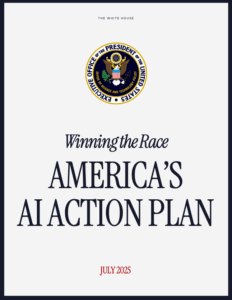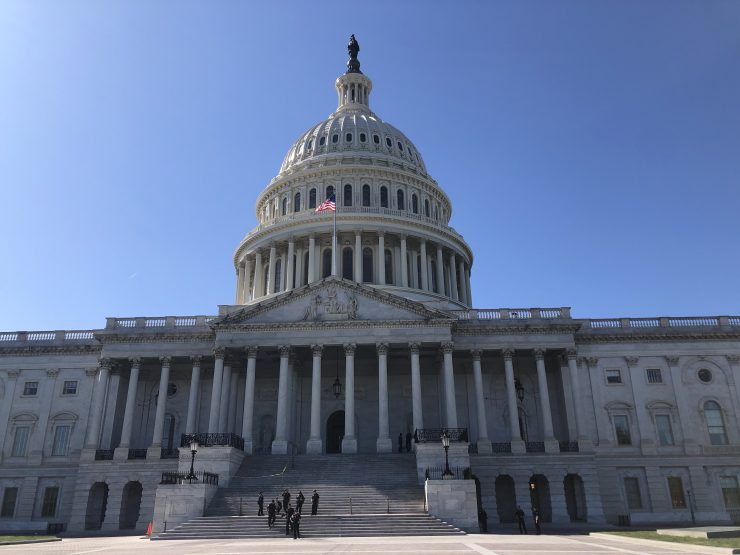Republican lawmakers are trying to nix regulations on artificial intelligence to fast-track development and beat China in an AI arms race.
President Donald Trump’s AI policy, published in July, sidelines existing government restrictions to support faster AI development. He and other Republican leaders want to position the U.S. as the global leader in AI exports, like chips and software.
“We have to stay ahead of China,” said Sen. Ted Budd, R-N.C., chairman of the Senate Science, Manufacturing, and Competitiveness Subcommittee, at a hearing Wednesday.
Budd said the U.S. must be at the forefront of disseminating AI across the world.
At Wednesday’s hearing, Sen. Ted Cruz, R-Texas, introduced a bill that would bring Trump’s AI policy into U.S. law.
The bill would allow AI development companies to get exemptions from federal regulations to make experimentation and development of new technology easier.
 Trump rescinded Biden-era AI regulations on his first day in office, before codifying his AI plan with three executive orders in late July.
Trump rescinded Biden-era AI regulations on his first day in office, before codifying his AI plan with three executive orders in late July.
His orders seek to build more AI data centers, promote American AI exports and weed out bias “woke” AI models in government.
Trump’s “AI Action Plan” builds on the policies he first implemented in 2018, testified Michael Kratsios, director of the White House Office of Science and Technology Policy.
That was the first time a president had designated AI as a “research and development priority” in their budget request.
Kratsios, the only witness at the hearing, is in charge of implementing Trump’s AI executive orders. Kratsios said he has made “tremendous progress” on carrying out Trump’s policies.
Consumer advocate slams bill
Ben Winters, director of AI and data policy at Consumer Federation of America, told The Wash that Trump’s policy is to “maximize AI company profits at all costs.” The federation is a D.C.-based consumer protection advocacy group.
Winters said Trump will likely “maximize” government contracts for large data companies, like Meta and OpenAI, while “hamstringing” consumer protection agencies, like the Federal Trade Commission and the Consumer Financial Protection Bureau.
Presidential executive orders have limited reach. Cruz’s bill attempts to bring Trump’s policy into American law.
Winters said he is “not encouraged” by Cruz’s bill.
‘Devastating’ impact
At Wednesday’s hearing, Democratic leaders slammed Trump’s AI plan for undermining consumer protections in the name of innovation and development.
Sen. Tammy Baldwin, D-Wis., bashed the Trump administration, saying despite pushing for technology development, Trump is known to “undercut” and “disregard” science. She highlighted the Trump administration’s cancellation of research grants as an example.
So far this year, Trump has cut over $2.3 billion of National Science Foundation and National Institutes of Health grants, according to Grant Witness, an organization tracking government cuts to research.
“We cannot be short-sighted. These attacks on our scientists, researchers, educators and students have devastating impacts on scientific advancements and our ability to compete globally,” Baldwin said.
Bruce Schneier, a Harvard University public policy lecturer with expertise on AI in government, said framing the development of AI as an arms race only benefits tech tycoons.
He said AI is successful in areas with heavy regulations, like the European Union, and the U.S. could benefit from stricter AI policy.
“This is a transformative technology that’s going to help and harm a lot of people,” he said in an interview with The Wash.
“Because it has the potential to change things, it really needs strong regulation.”















ѧ ֧ѧ֧ ٧ߧѧӧѧ֧ݧߧ ٧ѧߧڧާѧ֧ݧߧ ܧߧ֧ߧ, է֧ݧѧ֧ ֧ ڧէ֧ѧݧߧ էݧ ݧҧڧ֧ݧ֧ ԧݧҧܧڧ ڧݧ֧էӧѧߧڧ. ѧާڧ ӧݧ֧ܧѧ֧ݧߧ ѧ֧ܧ ѧ٧ݧڧߧ ֧ ֧էѧӧڧ ӧѧ ߧӧ ٧ߧѧߧڧ, ܧ ާԧ ܧѧ٧ѧ ݧ֧٧ߧާ ҧէ֧.
ݧڧ ҧݧ ڧߧާѧڧ – https://quick-vyvod-iz-zapoya-1.ru/